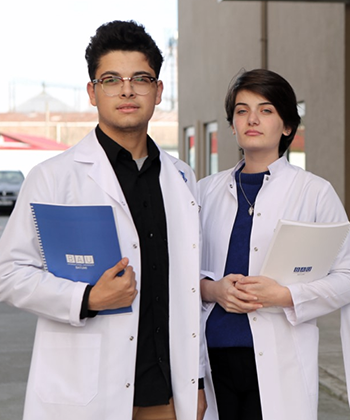
The current strategy, in line with the strategic development plan of BAU International University Batumi, outlines the main priorities for the development of scientific research. This strategy defines the directions of research activities and sets the primary goals for the higher education institution, which is recognized as a top university in Georgia.
The main goals of BAU International University Batumi's research development strategy are:
Enhancing the relevance and quality of scientific research within BAU International University Batumi.
Increasing the research potential of higher education institutions in Georgia.
Boosting the research potential of the academic staff at BAU International University Batumi.
Promoting transparency, objectivity, and ethics in research.
Conducting research that facilitates health improvement locally, regionally, nationally, and globally.
Developing interdisciplinary research and strengthening the links between natural and clinical sciences.
Realizing the applicability and commercialization potential of research.
Implementing fundamental and applied research and integrating them into educational programs.
Integrating applied research results into clinical practice.
Ensuring the sustainability of research activities.
Establishing close links with research and professional societies and associations.
Internationalizing research and establishing a place in the international scientific space.
To achieve the goals of the strategy, BAU International University Batumi has defined the following tasks:
Strengthening research support mechanisms for academic staff, including facilitating national and international research projects.
Liaising with scientific research centers and professional associations.
Creating and facilitating joint research projects with local and international universities.
Providing training for academic staff to improve scientific research skills.
Increasing the number and scope of research activities.
Determining priority research directions.
Organizational support for implementing scientific research.
Developing university funding mechanisms for research.
Strengthening research support mechanisms for academic staff.
Increasing the number and coverage of research activities (conferences, seminars, symposia).
More integration of scientific research into educational programs and promotion of student research.
Collaborating with foreign researchers and involving in joint research projects.
Conducting discussions and reviewing research papers with the participation of external experts.
Implementing standards of research culture, academic honesty, and ethics.
Implementing a system for evaluating the quality of research activities and indicators of research productivity.
Ensuring transparency of research results and introducing a periodic public reporting system.
Developing the commercialization potential of university research.
Immunohematological Studies:
Within the internal grant project, studies on neonatal alloimmune thrombocytopenia induced by maternal immunoglobulin G will be conducted. This includes HPA 1a and HPA 5b antigens, which are major causes of acute thrombocytopenia and intracranial rupture in newborns. The study is high priority and involves HPA and HLA genotyping, conducted in collaboration with the Medina Clinic Neonatology Department, and engages students and staff.
Epidemiological Study of Epilepsy in the Population of Ajara:
The study will differentiate and analyze various parameters such as the prevalence of active epilepsy, epilepsy-related mortality indicators, and antiepileptic treatment adequacy. It aims to calculate the mortality and morbidity rates, determining the economic burden of epilepsy in the region, and involves collaboration with international scientific projects.
Study of Spatial Memory Formation:
Assessing the allocentric system of spatial memory in urban and rural children aged 3 to 5 years, and evaluating the effects of prolonged use of digital technologies. The study plans to expand geographically and integrate electrospectrography tools to correlate attention deficits with spatial memory.
Study of Epigenetic and Autophagic Molecular Markers of Aging:
Conducted in collaboration with the University Hospital of Bonn and BSU, this study aims to explore the role of autophagy in aging under epigenetic influences. The research will be supervised by Bonn University Hospital.
Microbiological Studies:
Research on the microflora of the vagina during perimenopause and antibiotic resistance of mycoplasma and ureaplasma.
Pharmacogenetics and Personalized Medicine Research:
Focused on individual patient orientation by studying genetic polymorphism of the cytochrome P450 enzyme (CYPs), which influences drug metabolism. This research aims to develop dosage guidelines for physicians and involves students in polymorphism analysis using ELISA and real-time PCR.
BAU International University Batumi, with its comprehensive research strategy and global collaborations, remains a leading institution for scientific research and medical education, solidifying its position among the best universities in Georgia and offering excellent opportunities for those pursuing MBBS in Georgia

